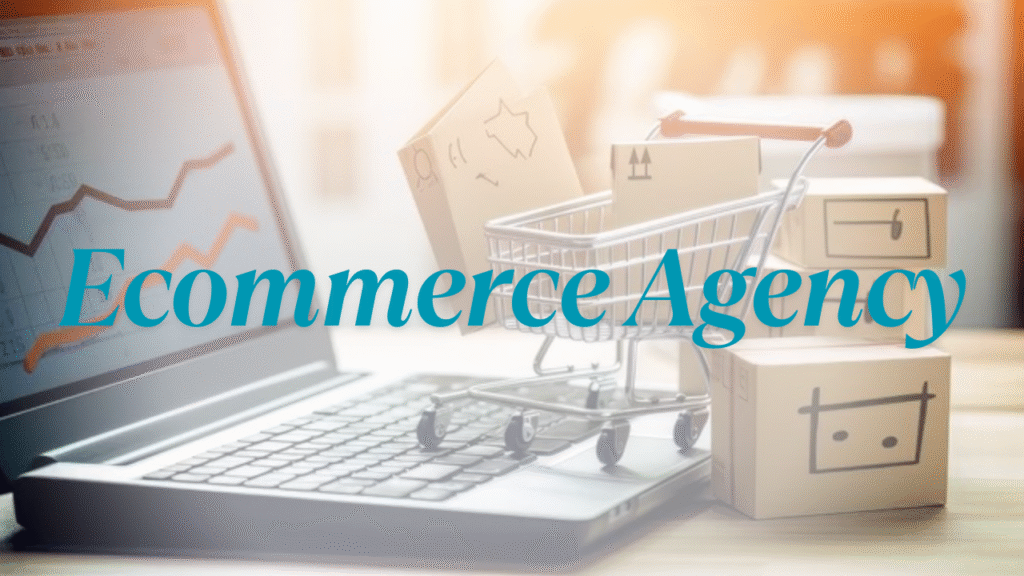The importance of choosing the right ecommerce agency cannot be overstated. This is that one critical decision you make that is going to decide your
- Business’s growth
- Customer experience, and
- Digital presence for years to come
Undoubtedly, each agency offers quite similar services such as website development, marketing, and support, but the quality, strategy, and alignment they bring can vary drastically.
To help you make an informed and confident choice, we have come up with five comprehensive tips that go beyond the basics. Rest assured, these tips are going to help you find a strategic partner who’s aligned with your business goals.

1. Define Your Goals, Budget, and Key Performance Indicators (KPIs)
Before making any move, you first have to define your business objectives. Know what you really want your ecommerce site to achieve. A few common goals are as follows –
- Increasing conversion rates
- Improving average order value (AOV)
- Growing organic traffic
- Expanding into new markets or regions
- Optimizing site performance and user experience
Be specific. You don’t have to say, “we want to get more sales,”, rather define the goal as – “need to increase our online revenue by at least 40% over the next 3 months through conversion rate optimization and email automation.”
Also, determine your:
- Budget range for both initial ecommerce website development and ongoing support
- Timeline for delivery and launch
- KPIs to measure success, such as conversion rate, bounce rate, customer lifetime value (CLV), return rate, or cost per acquisition (CPA)
Why does this matter?
When you are clear with what you need, the agencies will tailor their strategies, pricing, and timelines. Without clear goals, it’s hard for them to deliver results, and even harder for you to hold them accountable.
Action step – Just note down whatever your requirements are and then share it with each agency you have shortlisted.
2. Evaluate Agency Experience and Technical Capabilities
The most crucial tip you’ll ever get is to choose an agency that has a proven track record. It should not only be in general web design or digital marketing, but particularly in ecommerce.
What to check:
- Industry experience – Check if they have worked with businesses with similar niche as yours?
- Platform expertise – Cross-check if they are certified partners with platforms like Shopify, Magento, BigCommerce, WooCommerce, or Salesforce Commerce Cloud
- Case studies – Don’t ever fall for pretty visuals, read their case studies that have real-world instances and where they have delivered results.
- Technological understanding – Know if they can handle integrations with third-party tools such as ERPs, CRMs, inventory systems, or headless CMS?
Also ask if they’re familiar with:
- Headless commerce architecture
- Performance optimization (Core Web Vitals, speed, mobile responsiveness)
- Custom app development or API integrations
Why does this matter?
When you approach an agency that understands your industry and platform better, it is sure to deliver a high-performing site that meets your business and technical needs.
Action step – You can ask for 2-3 client references from the same projects. You can then get in touch with the client to know how the agency handled everything.
3. Review Communication Style & Project Management Approach
Clear, consistent communication is essential for a successful agency relationship. You want to know what’s happening, when it’s happening, and what’s expected from you.
Key areas to assess:
- Communication Style – Know how they are going to keep you in loop throughout the project. It is necessary to know how often you can expect to hear from them.
- Project Management Approach – See if they have a clear and efficient process for managing your project. You can directly ask them how they ensure that everything stays on track and within budget.
- Team Accessibility –Will you have direct access to the team working on your project? Knowing how accessible the team is can help you feel more comfortable sharing your thoughts and feedback as the project progresses. After all, collaboration is crucial!
Why does this matter?
Being able to deliver on time and meet your expectations relies heavily on having strong processes in place, not just good intentions. When an agency has clear systems and methods, it helps ensure that everything runs smoothly and that you get the results you want.
Action step – Request a sample project timeline with milestones, review cycles, and delivery checkpoints.
4. Understand Their Approach to Your Brand, Audience, and Strategy
See, you’ll come across multiple agencies, and most of them won’t bother to deeply understand your brand’s voice, visual identity, and target audience. But you don’t have to get disappointed, try until you get the one that does.
Look for signs of strategic thinking:
- Do they ask about your buyer personas, customer journey, or product margins?
- Are they interested in your brand positioning and content tone?
- Will they help you with conversion copywriting, UX design, and customer retention—not just visual design?
Don’t settle for surface-level solutions.
Many agencies can build a site, but fewer can build a strategy that resonates with your audience and drives sales. This includes email flows, product bundling, landing pages, loyalty programs, and cross-channel remarketing.
Why does this matter?
Ecommerce success isn’t just about the platform, it’s about storytelling, user experience, and persuasive design that converts visitors into buyers.
Action step – During discovery calls, ask:
“What would your first 90 days working on our brand look like?”
This will reveal how much thought they give to brand fit and long-term strategy.
5. Compare Pricing Models, Contracts, and Long-Term Support
While cost is always a factor, it should never be the only one. Instead of simply comparing quotes, compare values.
Understand the pricing structure:
- Fixed project fee – Common for website builds
- Hourly or day rate – Used for ad hoc tasks or retainers
- Retainer model – Best for long-term marketing or development work
- Performance-based pricing – Less common, but can work for advertising or CRO engagements
Also clarify:
- What is included in the proposal (number of design revisions, training, analytics setup)?
- Are there ongoing support or maintenance packages?What happens if the project takes longer than expected?
- Can the scope be scaled up later without renegotiating from scratch?
Why does this matter?
Choosing the lowest-cost agency might save money upfront but can cost far more in missed opportunities, poor performance, or rebuilds later.
Action step – Ask for a sample contract or terms of service, and make sure it includes clear deliverables, timelines, and exit clauses.
Final Checklist to Choose the Right Ecommerce Agency
| Areas | What to Ask |
| Goals & KPIs | What metrics will define success for us? |
| Platform Experience | Have you worked with this ecommerce platform before? |
| Case Studies | Can you show results from businesses like ours? |
| Communication | How often will we meet? Who will we work with directly? |
| Strategy | How do you approach UX, brand storytelling, and CRO? |
| Pricing | What’s included in your proposal and retainer options? |
| Support | What does your post-launch maintenance plan cover? |
4 Things That Truly Make an Ecommerce Agency Great
- They Get Your Business
A great agency doesn’t just know marketing, they understand your industry, your products, and your customers. They speak your language and know what actually works for your niche. - They Care About Your Customers
The best agencies treat your customers like their own. They design strategies that build trust, improve experiences, and protect your profits, never pushing campaigns that might hurt your brand in the long run. - They’re Focused on Real Results
It’s not about fluff. A good agency is focused on growing your revenue. They help you spend smarter, cut waste, and make sure your investment turns into actual business growth. - They Track What Actually Matters
Instead of flooding you with random data, they track the metrics that help you grow, like conversion rates, order values, and return rates—and constantly look for ways to improve.
Conclusion
Choosing an ecommerce agency is one of the most important decisions you’ll make in scaling your digital presence. It requires more than comparing portfolios or pricing tables. It requires strategy, process, alignment, and trust.
By defining your goals, digging into technical and industry expertise, understanding how agencies communicate and manage projects, prioritizing brand fit, and comparing value not just cost, you’ll be far better positioned to make a choice that delivers real business growth.
Your agency shouldn’t just build your website. They should help build your success.
Frequently Asked Questions
How can we assess an agency’s cultural fit with our team?
Schedule initial meetings to gauge their communication style and responsiveness. Ask about their approach to collaboration and how they handle feedback. A good cultural fit will foster a productive partnership and ensure that both teams work harmoniously toward shared goals.
Do ecommerce agencies offer post-launch support?
Yes, most reputable agencies offer maintenance, troubleshooting, analytics reporting, marketing optimization, and retainer-based ongoing support plans. Always confirm what’s included in your post-launch package.
How much involvement will our team need during the project?
Expect to dedicate 5-10 hours per week for meetings and feedback. A good agency will clearly outline their needs and assign a project manager to streamline communication and keep things on track.
What should we look for in an agency’s portfolio?
Focus on case studies that showcase measurable results, like increased sales or improved user engagement. Look for diversity in projects and ensure they have experience in your industry.

